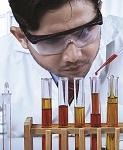
 Today, all across the country, biotechnology entrepreneurs are developing the types of game-changing innovations that will transform the way we heal, fuel and feed the world. As more of these groundbreaking innovations come to market, they will not only provide enormous societal benefits, but they will serve as an economic engine for our economy.
Today, all across the country, biotechnology entrepreneurs are developing the types of game-changing innovations that will transform the way we heal, fuel and feed the world. As more of these groundbreaking innovations come to market, they will not only provide enormous societal benefits, but they will serve as an economic engine for our economy.
According to the Department of Commerce, innovation has been responsible for two-thirds of economic growth since World War II. A comprehensive report released by the Biotechnology Industry Organization (BIO) and Battelle shows biotechnology continues to be one of the most important drivers of recent innovation and job creation – and given the incredible advances in science, our industry is poised to be at the forefront of innovation and economic growth for generations to come.
The report, titled “Battelle/BIO State Bioscience Jobs, Investments and Innovation 2014,” was released at the BIO International Convention in San Diego. It shows that the biotechnology industry was able to weather the financial downturn better than most industries and is on a course for continued, long-term growth.
So unleashing the full potential of biotechnology – in health, in biofuels and renewable chemicals and in the food and agricultural sector – in communities across the U.S. will allow us to ensure the economic and societal benefits of our products can reach more communities and more families.
The Battelle report’s state-by-state industry assessment finds U.S. bioscience firms directly employ more than 1.6 million people.
Within the private sector, the bioscience industry has been a signature performer over this period, contributing an additional 6.2 million jobs through the indirect employment effect, yielding a total employment impact of 7.8 million jobs. Furthermore, the bioscience industry continues to create and sustain high-wage jobs, paying an average 80 percent more than the overall private sector average salary – and growing at a faster rate.
Additional highlights from the report include the fact that:
-
The bioscience industry is well distributed across the United States and plays a major role as an economic driver. Thirty-three states and Puerto Rico have an employment specialization (20 percent or more concentrated than the nation) in at least one of the five bioscience subsectors, which include agricultural feedstock and chemicals; bioscience-related distribution; drugs and pharmaceuticals; medical devices and equipment; and research, testing and medical labs.
-
In the recent 2007 to 2012 period, which includes the recession and early years of the recovery, 28 states had overall job gains in the biosciences.
-
Of the nation’s 381 metropolitan areas, 216 have a specialized employment concentration in at least one of the bioscience subsectors. Twenty-nine regions have a specialized employment concentration in at least three of the five subsectors.
 Building on this Success
Building on this Success
Our goal at the Biotechnology Industry Organization (BIO) is to make sure we build on this momentum and realize the full potential of biotechnology innovation.
We do this by working with companies, elected officials and thought leaders across the country to make sure the public policy infrastructure and regulatory environment is in place to support a thriving biotechnology ecosystem.
And while there is a great deal for us to celebrate in the Battelle report, our analysis also shows there is work that needs to be done to sustain industry growth and to ensure innovation can continue to flourish in the United States.
The U.S. remains a leader in medical, agricultural and industrial biotechnology innovation. But global competition is increasing. In 2008, China pledged to invest $12 billion in drug development, and in 2011, the Chinese government named biotech one of seven industries that will receive $1.7 trillion in government funding over a five-year period. The European Union’s Innovative Medicines Initiative is pumping $2.65 billion into Europe’s biopharma industry.
To sustain our global leadership, the U.S. needs continued investment and policies focused on supporting and incentivizing the next generation of biotechnology innovations.
Only by continuing to build and strengthen the biotechnology research and development ecosystem will we maintain global leadership, be in a position to increase U.S. jobs, and ensure that all Americans have access to the benefits of biotech innovation. To make this possible, we need:
-
Adequate funding for basic research at NIH
-
Policies that drive technology transfer from the academic community into startups
-
Appropriate tax policy that reflects the needs of innovators, investors and entrepreneurs
-
Tools that support and incubate startups and help get them through the valley of death.
-
The right regulatory policies at the FDA, EPA and USDA
-
Protection of intellectual property
-
Adequate and fair reimbursement policies that help pull medical innovations through the arduous drug development cycle.
Smart public policy provides confidence to private investors and gives entrepreneurs the tools and predictability they need to attract the private capital required to grow their businesses, commercialize their science and get good products to market.
Take the JOBS Act, which made it easier for emerging companies to access capital in the public markets. Since the passage of the JOBS Act in April of 2012, we’ve had more than 110 biotechnology companies go public. This has given emerging companies across a range of therapeutic areas the ability to access the public markets to fund critical research and clinical trials and to scale their operations.
 Strong State Bioscience Ecosystems
Strong State Bioscience Ecosystems
And it’s not just Federal policies that are important. All across the country, state and local governments are putting in place the policies needed to support a successful bioeconomy. At BIO, we have worked to develop some best practices at the state level. These include:
-
State laws that create a pathway for the substitution of interchangeable biologic medicines. (See BIO’s principles for on biologic substitution at bio.org)
-
Establishing favorable conditions for bioscience industry cluster development and growth
-
Support for industry-university collaborations
-
Refundable R&D tax credits
-
Tech transfer programs
-
IP protections
-
Business incubator development
-
Matching SBIR funds
-
Efforts to advance university generated research toward commercialization.
The reality is you can have the best entrepreneurs and scientists at your companies, but if the policy environment isn’t right, you simply can’t bring new innovations to market and you won’t be able attract private investment.
And that is our focus at BIO. Making sure our members have the policy and regulatory environment to heal, fuel and feed the world. It’s what we fight for every day in Washington and in capitals around the globe.
You can learn more about BIO and our industry-leading events and conferences on the bio.org website, including the BIO International Convention, which will be held in Philadelphia from June 15 – 18, 2015.
The BIO International Convention is the world’s largest gathering of biotechnology leaders from around the world. Last year’s conference included keynote conversations with former Secretary of State Hillary Clinton and Sir Richard Branson. So, we look forward to seeing you in Philadelphia.

